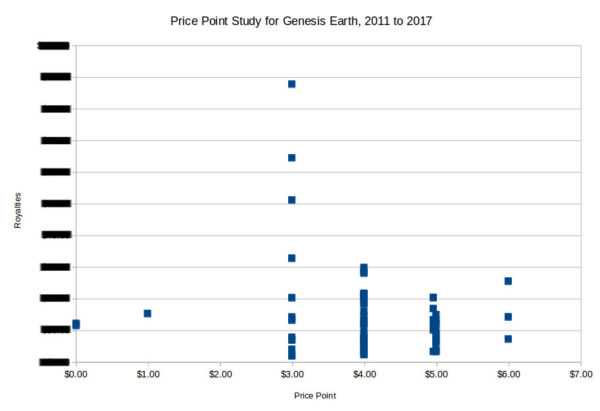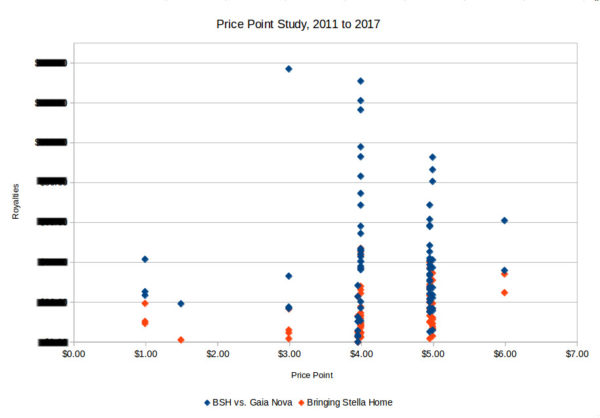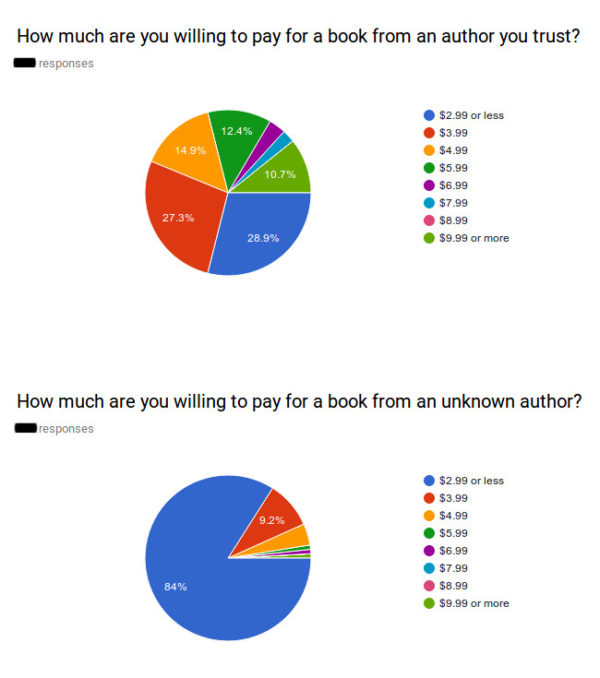Last October, Dean Wesley Smith wrote an interesting blog post on the subject of pricing. As an indie writer (or really, as a small business owner in general), pricing is one of those things that’s constantly on my mind. Pricing too high can be fatal for any business, but pricing too low can be a terrible mistake as well.
Dean Wesley Smith’s pricing strategy basically went like this:
Novels
- $3.99 to $6.99
- Price according to genre, not length
- Romance on the lower end
- Mystery on the higher end
- SF&F in the middle
Short Stories
- $1.99 to $3.99
- Price according to length, not genre
- $1.99 for under 3k words
- $2.99 for 3k to 10k words
- $3.99 for 10k to 20k words
- Over 20k words price as a novel
From November until now, I’ve basically followed this strategy, with a few tweaks for short stories. Under 1k words, I’ve priced at $.99, and between 3k and 20k words, I’ve priced at $2.99. It’s only at 30k words that I’ve priced my books as novels.
This isn’t my first time experimenting with prices. I’ve been publishing since 2011, and have all of the sales reports and other data in one form or another. So last week, I decided to crunch that data and compare it with the last four months.
 Genesis Earth is my first novel, and the book on which I have the most data. It’s a 70k word YA science fiction novel.
Genesis Earth is my first novel, and the book on which I have the most data. It’s a 70k word YA science fiction novel.
Crunching the data, I found that on average, the book performed best when priced at $3.99, with a few outliers at $2.99. However, most of those outliers are from 2011, before Kindle Unlimited or KDP Select, and before the book had fallen off of the 90 day cliff. Excluding the first two quarters of 2011, those outliers fall away.
 Bringing Stella Home is the first book in the Gaia Nova series, and the book for which I have the most data that is also part of a series. It is a 110k word space opera novel.
Bringing Stella Home is the first book in the Gaia Nova series, and the book for which I have the most data that is also part of a series. It is a 110k word space opera novel.
Interestingly, the book appears to perform differently as a standalone than it does as part of a series. As a standalone, it appears to perform best at $4.99, but the series as a whole performs best when it’s priced at $3.99.
By the way, I tend to price all the Gaia Nova books at the same price point, so except for $.99 and $1.49, it’s fair to assume that all the books share the same price as Bringing Stella Home for any given datapoint.
 Interestingly, the data tend to confirm the results of an ebook pricing survey I sent out to my email list about a year ago. The results are pictured above. More than half of respondents said that they were only willing to pay $3.99 or less for an ebook from an author they trust, and more than 80% weren’t willing to pay more than $2.99 for an unknown author.
Interestingly, the data tend to confirm the results of an ebook pricing survey I sent out to my email list about a year ago. The results are pictured above. More than half of respondents said that they were only willing to pay $3.99 or less for an ebook from an author they trust, and more than 80% weren’t willing to pay more than $2.99 for an unknown author.
Unfortunately, I don’t have enough pricing data for my novellas and short novels (under 50k words) to draw conclusions for any other price points besides $.99 and $2.99. Obviously, the $2.99 price point performs vastly better than $.99. There’s a little more nuance than that when it comes to series pricing, but I’m keeping that data close to the chest.
I have yet to crunch the data for my short stories. When I do, that will probably be the subject of another blog post.
From these results, it appears that $3.99 is the sweet spot, both for series and for standalone novels. The data from the last three months are not included in the graphs, but from what I’ve managed to gather my books do not perform as well when I use Dean Wesley Smith’s pricing strategy. It was worth trying out as an experiment, but four months during the prime bookselling time of the year is enough to conclude that it doesn’t work, at least for my books and my readership.
Here’s the pricing strategy I’ll be using from now on:
Novels (over 50k words)
- $4.99 to $5.99 for frontlist and new releases
- $3.99 for backlist
- 99¢ and free for promotions
Novellas and Short Novels (10k to 50k words)
- $2.99 for frontlist and backlist
- 99¢ and free for promotions
Short stories (under 10k words)
- I have no idea. Still need to figure that out.
1 comment